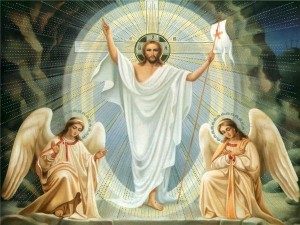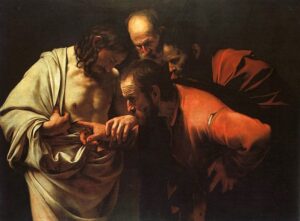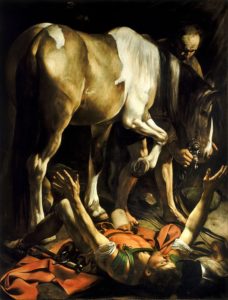“The resurrection of Jesus is fundamental to our faith, but that does not mean it happened exactly as it is described in the various biblical accounts. What it does tell us is that, after the desolation of Jesus followers as a result of his death, they gradually began to realise that in a mysterious, but very real, way he was still with them. In other words, maybe their experience of the reality of Jesus in their lives wasn’t that different to how we can also experience him in our own lives, and in our communities when we gather to pray and celebrate. The detail of how this happened doesn’t really matter very much.”
~*~
In these 113 words Fr Tony Flannery has given us a glimpse of his current thinking on a foundational principle of Christian belief and practice. An experience of transformational importance for the earliest Christians – an experience resulting in detailed, insistent accounts of a touchable, resurrected Jesus who had eaten real food with his friends – seems to become for Fr Flannery something very different, even nebulous.
The experience we have today of ‘Jesus in our lives’ can vary enormously in intensity and ‘realness’, and surely depends on the degree to which we can believe the Gospel assurance of a complete victory of Christ over death. Tony Flannery’s account as it stands could be taken to mean that those first Gospel witnesses to a ‘Resurrection’ were merely reconstructing Jesus from memory. This would be for many a severe test of faith, rather than an affirmation of it.
If this is indeed Tony’s meaning I cannot believe that he has reflected seriously on the full import of this conclusion. It would imply that the Gospel accounts were deliberate, even if well-intended, fabrications. That would make the entire history of Christianity inexplicable.
 Why, to begin with, would Jesus have been considered worthy of such remembrance if his own predictions of his restoration to life had been proved delusional? Who would then stake his own life to proclaim possibilities that had led Jesus himself only to ridicule and the cross? What possible psychological profile could explain the restoration of the Christian community on a known basis of mere make-believe?
Why, to begin with, would Jesus have been considered worthy of such remembrance if his own predictions of his restoration to life had been proved delusional? Who would then stake his own life to proclaim possibilities that had led Jesus himself only to ridicule and the cross? What possible psychological profile could explain the restoration of the Christian community on a known basis of mere make-believe?
My understanding is that most scripture scholars, even those who can’t believe in the Resurrection, agree that the trajectory of Jesus’ faith and mission of obedience to the God of Abraham led him to a lonely death, and that his followers lacked the firmness of conviction to stand with him at the end. This poses two critical mysteries, even for the most sceptical. First, what was the source of Jesus’ strength of faith and character? Second, what was it that subsequently transformed those thoroughly frightened and runaway followers into death-defying proclaimers of his resurrection?
Tony Flannery’s current answer to the second question seems to be that this extraordinary transformation arose simply out of fond remembrances of a man whose faith had proved delusional – culminating in an agreement to maintain that it had not. It would seem to follow logically that these deliberate myth-makers did this while knowing that Jesus had probably been mentally unbalanced – and that they were now ready to die in defence of a claim they had no reason to believe themselves.
Is all of that truly more plausible than that these earliest Christians experienced something so totally unexpected and unusual as to convince them that far from being both mad and dead, Jesus had correctly predicted an event that they themselves had factually witnessed – the intervention of the Father to whom Jesus had appealed, to raise Jesus from the dead in conclusive defeat of the attempt to erase him, bodily and finally, from life and history?
To be clear here, I am not claiming to know what exactly the experience of that intervention was, or even to understand completely the Gospel accounts of it. I am arguing instead that those accounts are a clear anticipation of any ‘non-real’ explanation of what happened, including the ‘sorrowful reminiscence’ version.
In particular the account of the radical doubt of the apostle Thomas in the Gospel of John is clear evidence of the anticipation by the author of all scepticism about the historical truth of the event. That account, including Thomas’ subsequent touching of Jesus, makes that Gospel a most cynical fabrication if that encounter was known not to have happened, in literal fact. I cannot believe that the author was recounting anything other than what he sincerely believed, on credible testimony, to be historically true as described. To think otherwise is to consign that Gospel to the ‘deliberate alternative facts’ shelf. How could deceit of that order have founded a martyr’s faith?
As to the ‘scientific possibility’ of bodily resurrection, given the expanding mystery of all matter, including every atom in the human body – the fact that this mystery grows rather than shrinks the more closely scientists study the particles that compose the atom and the relationships between them – who can any longer speak of ‘natural’ and ‘supernatural’ phenomena, as though that distinction was any longer clear? The whole of material creation remains an unexplained mystery.
And given the healing mystery that Jesus also is to us – especially as a source of hope that our own lives may just be starting – why resort to banalities to replace the belief that so many generations of Christians have relied upon, especially in the deepest grief and fear? If Jesus’ central belief was delusional, and his trust in the Father was in vain – and his earliest followers were capable of such deceit – why should anyone gather today to celebrate his memory? What hope or consolation could come from such a gathering?
St Paul, not a witness to the Resurrection, believed in it nevertheless. He knew what was at stake.
“If there is no resurrection of the dead, then Christ cannot have been raised either, and if Christ has not been raised, then our preaching is without substance, and so is your faith. What is more, we have proved to be false witnesses to God, for testifying against God that he raised Christ to life when he did not raise him — if it is true that the dead are not raised. For, if the dead are not raised, neither is Christ; and if Christ has not been raised, your faith is pointless and you have not, after all, been released from your sins. In addition, those who have fallen asleep in Christ are utterly lost. If our hope in Christ has been for this life only, we are of all people the most pitiable. In fact, however, Christ has been raised from the dead, as the first-fruits of all who have fallen asleep.” (1 Cor 15: 13-20)
Tony Flannery knows this passage as well as I do, so perhaps as a commentator and teacher he is simply kite-flying, tongue-in-cheek – in the cause of adult education. He has certainly got me going with this particular kite. He is right to question the usefulness of ‘too much’ doctrine, but all prayer and faith is founded on a core of vital belief. If St Paul’s stated belief in the Resurrection was also either a delusion or a fond fabrication, what Christian conviction can remain to sustain anyone?
Sean O’Conaill




I spent an hour in this box which then disappeared.
The essence of my comment is that I know that the Lord lives within me – despite my human failings . I am at a point of existence where I could not survive without Him- He has brought me through the valley of darkness where I could not survive on my own.
Did He rise from the dead ? – I was not there – but He sure lives inside me- the Cross was not the end because He is alive in me- this is not a feeling or psychological impression.- this is real and alive and He is changing me as I sleep.
I do not need to examine the question.
What is Fr. Seán Flannery getting at ?
Is it an attempt to dilute the miraculous nature of the Lord for popular consumption !
Miracles do happen, life itself is a total miracle, the composition of a single cell resembles a city in complexity- science and philosophy are merging in face of the awe of the Universe (s).
We are all infants before the majesty of what is.
The only way forward is to soak ourselves in Him – totally.
Second time lucky I hope!
I identify with the thoughts of both Seán and Frank.
Without an extraordinary experience of Jesus raised by the Father, transformed after his death, his terrified friends would not have had the courage and new hope in the face of death which we all as humans seek.
May every day be an Easter for you!
Well written Sean; a clear and convincing critique of Tony Flannery’s statement on the Resurrection of Jesus, while protecting its essential nature of mystery.
There is a fine line between ‘essential questioning’ and ‘unnecessary undermining’ of faith. I fear Fr. Tony may have crossed into the latter situation.
I have been thinking a lot over Fr. Tony’s words and am wondering if he is saying any more about the resurrection of Jesus than Pope Benedict X1V in his book ‘Jesus of Nazareth; The Infancy Narratives’ said about the birth of Jesus.
In other words, the historical core of the major events in the life of Jesus (human birth, human death and human resurrection) are to be believed as foundational tenets of Christian faith but additional details may have been added by biblical authors or redactors of these events to help explain and interpret their inner reality, especially in terms of fulfillment of prophecies. In Jewish biblical terms that process is known as ‘Midrash aggadah’, a rabbinic principle for interpreting their Hebrew scriptures. Since the early writers of the Christian scriptures were Jews their use of that genre is quite possible, even likely.
Tony does say that after His death “he was still with them”. However I think he weakens his case when he adds “maybe their experience of the reality of Jesus in their lives wasn’t that different to how we can also experience him in our own lives..”
Ours is a conviction of the real , though resurrected or heavenly, but non-physical presence of Jesus the Christ within and all around us (as in Sacred Scripture, Eucharist and all the sacraments) but the missing body from the tomb clearly indicated a firm and foundational belief by the early Church in Christ’s physical resurrection.
The theory of ‘modes of existence’ may be of help here. By this theory the resurrected Jesus moves between the two major modes or dimensions of reality, the physical and the resurrected modes or in other words, the earthly and the heavenly modes. That would help explain in modern terms the issue of the resurrected Jesus moving through physical walls into a locked room where the disciples were gathered (Christ in heavenly mode) and then Thomas touching the physical body of Jesus (Christ in earthly mode). That might also help explain why the risen Christ was not recognised at first by some of His closest friends (while He was in heavenly mode of real existence) but later sat down and broke bread with some of them (Christ having moved into earthly mode of real existence).
By this theory we do not cease to exist after death; death merely moves us from one mode of real existence (earthly and physical) to another mode of real existence (heavenly and spiritual). “Life is not ended but merely changed.” (Catholic Funeral Service). Helpful?
It would be interesting to get Fr. Tony’s response to this!
That is indeed helpful, Aidan – and I too would be interested to hear Tony’s comments. As his single paragraph on this topic is open to different interpretations it would be unfair to conclude that he has ruled out what you propose here. Best simply to leave that possibility open.
Sean,
thanks for your contribution, its a welcome piece and adds in a positive light to the discussion particularly in this season of Easter,